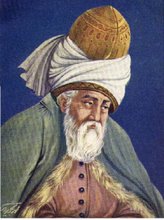- Song of a Majnun
Song of a Majnun
A Lover, like this Majnun, is a nomad in the desert called longing,
He sighs that which is forbidden and is drunk with that which is unlawful for many,
For how else shall he move with the impulse that is borne of the silence of the day, enthroned above the clamorous world, and buried in the solitude of the night?
Friend, in this Lover's world, that which is called lovesickness by many is not a disease,
It is merely an arrow which is hard to pluck and yet leaves him painful as it remains.
Who can bear the loneliness of the long distance if not he who has been stolen from himself at the gate of Love?
But tell me, what greater joy is there beyond every little breeze of the Beloved that claims his sanity?
Like unto the forgotten dust,
Like unto the trodden butterfly,
Like unto the crushed flower,
Like unto the broken wings,
He bears Love's curse throughout his life of seasons.
He loves a certain Layla, whose beauty bears the likeness of the wine unto the drunkard,
Before whom, his own affection tortures the soul of his soul.
How could he not love the daughter of his own passion fashioned of prayers and dreams,
Who is not a stranger in his tranquility?
How could he not be moved in passion when the Beauty of the Beloved
How could he not yield to Love,
When its high tides arrive upon the shores of his aloneness,
As if ready to take his breath away in a thousand ways?
He who loves like this Majnun....
He must but drink Love's spontaneity and ecstasy at the dawn of his delight,
But oh when fields of flowers are yet to be kissed by the sun,
The wind is soon moistened with sorrow,
As the rain softly blends with his madness.
He loves his Shirin like a sickness and its cure at once,
He must but be slain by his Beloved for that which cannot be offered nor bought at any price.
A bleeding Bedouin is he with naked sentiments:
O you, before whose Beauty spring flowers shall whither,
Before whose smile the sun and moon shall vanish in shyness,
And before whose gaze the heavens shall no longer remain at rest!
I love you without knowing since when or from where,
Without complexity as a pride.
By He Who causes Love to be a Reality
And Who desires my extincton in it,
I love you, O honey and sugar of my life,
Because I know no other way than this!"
A victim unto his own passion is he,
But who can blame the child of the solitary night
Tell me, my Friend, how can the moon hide its agony from the distant stars?
And how can the silence of the deep spaces not turn into lamentations?
When the pricking pinions hidden in Love's wings desire your martyrdom,
How can you refuse Love's call and not break the symmetries of sanity upon its rocks?
Elaborate are the silky patterns that adorn the depths of his pain of separation,
And not even the seven seas can reflect them on their surfaces.
Oh let me befriend the lonely path and the forgotten rain-caressed grass
Trodden upon by the Qalandars and run over by the wheels of fate.
I would rather breathe Love's agony and converse with ailing lovers and wounded dreamers,
Than close my eyes from the Beauty that my Beloved is.
I would rather be murdered by my Beloved's rejection,
Than empty my heart, the shrine of my submission, of her Image,
For if I die, my blood shall flow and intoxicate the heart of every heart.
I would rather kiss my Beloved's thorns in this tavern of ruins,
Than be amazed with something else and die in distraction and forgetfulness.
I would rather fall and shatter as I hit Love's thrashing floor,
Than soothe my soul with the hope of a new morning and mortal dreams,
For how can a Lover pretend not to be sick with Love's severity?
This ghazel testifies that your Love is still alive and burning!













